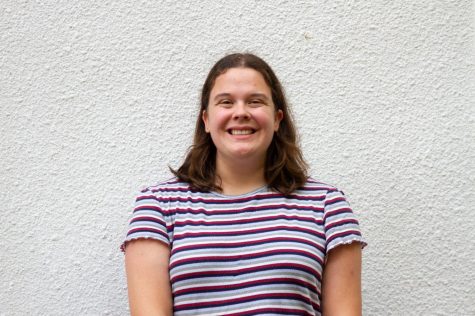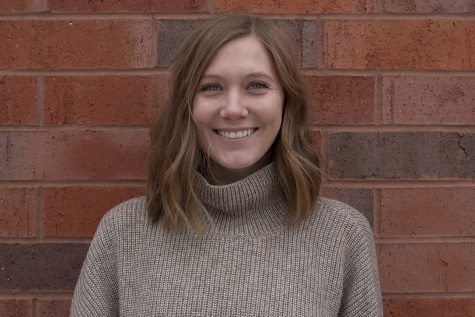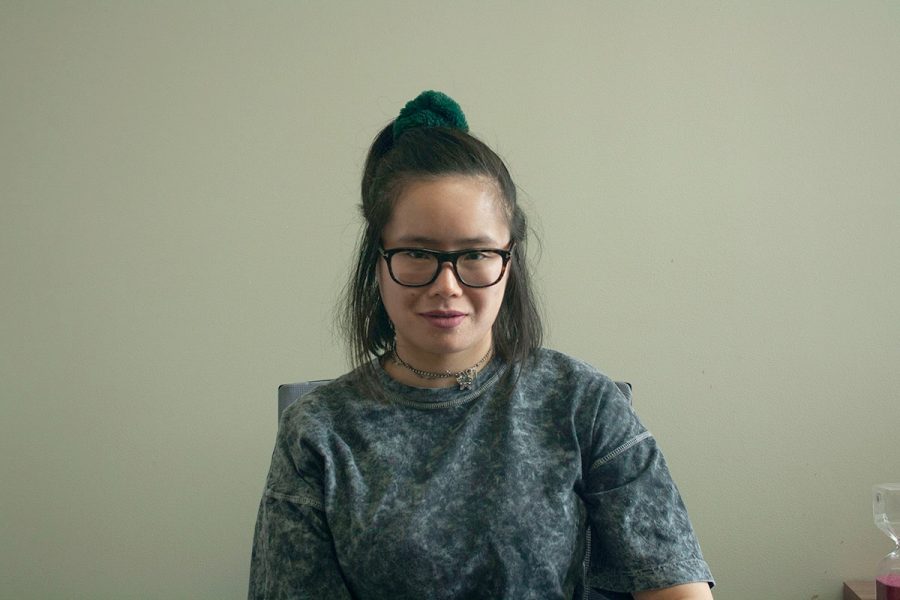Respect the art, respect the craft
Dorothy Chan speaks poetry, teaching and determination
Photo by Morgan Burke
Chan says food, sex and fantasy are the three words that express the essence of her poetry.
Dorothy Chan, UW-Eau Claire’s assistant professor of English and the managing editor at Barstow and Grand, joined the faculty last semester. Chan is a passionate poet, the inventor of triple sonnet and the author of “Revenge of the Asian Woman,” “Attack of the Fifty-Foot Centerfold” and the chapbook “Chinatown Sonnets.”
Chan said she knew UW-Eau Claire was where she wanted to teach creative writing because of the supportive and friendly community in the English department.
She allows her students to be vulnerable in her class and find their clarity through writing about topics that are difficult to discuss, Chan said.
“I think that creative writing is an important subject, because it gets to the core of our emotions and the core of our being,” Chan said. “The form of poetry in particular lets us to get deep into our psyche.”
In terms of challenges of teaching creative writing, Chan said she tries to professionalize students to get them ready for publishing their work and see the professional side of poetry. Her goal as a professor and as a writer is to show students the importance of poetry not only on an artistic level, but also as a profession that is more than just a side hobby, she said.
“I always tell my students that we have to work and put in the hours, because as much as poetry and writing in general is a form of art, it is also a craft and it takes discipline,” Chan said.
Alongside creative writing, Chan also teaches a course in women’s literature within the Women’s, Gender and Sexuality Studies program that focuses on works by queer women and women of color. Chan said she was honored to be a WGSS affiliate, because she has always been an advocate for intersectional feminism and queer literature.
“These topics are important to me personally as a queer Asian-American woman, that’s what I write about in my poetry,” Chan said. “We need to expose our students to all kinds of voices and different identities to ignite a larger conversation.”
B.J. Hollars, an associate professor of English, said Chan brings a spirited commitment to supporting other writers while also being an accomplished writer herself.
“Dorothy (Chan) is an energetic, enthusiastic and talented colleague who always looks for opportunities to collaborate in the classroom and beyond to ensure most opportunity for students and community members,” Hollars said. “It’s been a pleasure to connect with her on a variety of projects.”
Hollars said Chan provides a strong voice in her poetry and teaching, which reaffirms that she teaches what she preaches. Chan’s work serves as an inspiration for a lot of student writers who want to pursue a similar career path, he said.
“(Chan) is helping students with their writing, but when she’s not in the classroom, she’s busy making her own art and that’s always rewarding for students to see,” Hollars said. “Her poetry is very narrative, it tells a story, it creates moments of emotional turn.”
Chan’s work does not end with UW-Eau Claire’s English department — she is also the poetry editor at Hobart, a literary journal and she recently joined Barstow and Grand as the managing editor. Chan said she is excited to illuminate the voices of writers in the upper Midwest and bring in a diverse range of poetry.
“We have such a vibrant literary community around Eau Claire already and we want to expand beyond that to bring more people together,” Chan said. “That also includes young writers, because early publications are very important in shaping a writer’s identity in the long run.”
Rebecca Mennecke, a third-year English creative writing student and an intern at Barstow and Grand, says she is honored to have the opportunity to work with Chan and learn from her at the same time. Mennecke said she is confident that Chan will be absolutely phenomenal with picking good pieces for the journal.
“(Chan) is so prolific and so talented. She teaches me something new every single day and gives the best feedback,” Mennecke said. “Not only does she bring editorial and publishing experience to Barstow and Grand, but also her network of writers and her eye for poetry.”
As a young writer herself, Chan said she always knew she was going to pursue arts in some form. She said she got her first publication when she was just 10 years old, but at the time she did not know if that was a viable career because of the stereotype and stigma around it.
“That’s why I’m grateful to be a professor and teach students how to actually apply the skill to a job that pays,” Chan said. “It’s a risk and many are afraid to take that risk to become writers. But surprises are the best part about life.”
Food, sex and fantasy are the three words that express the essence of Chan’s poetry. She said she takes a lot of inspiration from drag performances, fashion and visual and culinary arts.
“If my poetry embodied a different form, something else other than poetry, it would be a fabulous dinner buffet on circular rotating tables on the highest floor of a building in an amazing city,” Chan said. “It would be a big party for drag queens and artists.”
However, inspiration and talent is not enough to become a good writer. Chan said she cannot stress enough how important it is to be determined, disciplined and willing to put in hours of work.
“We often have this stereotype that a genius is born, but even a genius has to work for their craft,” Chan said. “Respect the art. Respect the craft. I still push myself to learn new facets of poetry almost every day.”
Klavina can be reached at [email protected].

Morgan Burke is a fourth-year photography and multimedia communications student. This is her fourth semester on The Spectator, and first as Multimedia Editor. In her free time, she loves to make hyper-specific Spotify playlists and eat avocado toast.












